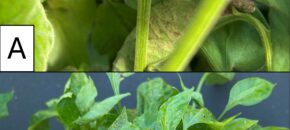
Warmer temperatures and periodic rains in the last few weeks helped early July peach varieties achieve a bigger size. There are excellent peach varieties throughout the harvest season; however, each has a few challenges, and understanding the overall tree and fruit characteristics can help make thinning, harvest, disease management, and post-harvest decisions. The Newer varieties […]
Continue reading...

